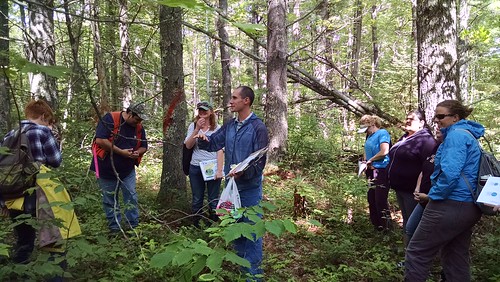
USDA celebrates National Native American Heritage Month in November with a blog series focused on USDA’s support of Tribal Nations and highlighting a number of our efforts throughout Indian Country and Alaska. Follow along on the USDA blog.
When you are faced with a big problem, it helps to have all your friends working together.
There’s a great example of this philosophy playing out in the Northwoods of Minnesota, Wisconsin, and Michigan between the Great Lakes Indian Fish and Wildlife Commission, an organization that supports the hunting, gathering, and fishing treaty rights of 11 member Ojibwe tribes and the U.S. Forest Service. Representatives of the Commission and Forest Service meet regularly to collaborate on a wide range of issues, including wildlife management, law enforcement, and youth education.
This kind of government-to-government collaboration requires commitment from everyone, but it has helped both GLIFWC and the Forest Service accomplish more than either could have accomplished alone.
Climate change is an issue of growing concern for Great Lakes Indian Fish and Wildlife Commission and member tribes. Tribes in the Upper Great Lakes states of Minnesota, Wisconsin and Michigan have long-standing connections to natural ecosystems across the region that help sustain people, Native culture, and economies.
In many cases species and ecosystems of iconic importance to tribes are already threatened by climate change or are expected to be threatened in the future. Some of these species include sugar maple, paper birch, and wild leek. Losing these species, and others, would mean more than just losing the sources of food, crafts and means of making an income -- it would mean losing an irreplaceable aspect of Ojibwe culture and identity.
Given these potential profound impacts, tribes are exploring ways to blend traditional ecological knowledge with scientific knowledge about climate change impacts and strategies for adaptation. The Forest Service is working with the Commission as it works to launch a phenology (life cycle) study on the Forest Service’s Chequamegon-Nicolet National Forest in Wisconsin to learn about the shifting seasonal patterns of several culturally-important plant species. This information will be combined with traditional knowledge from Commission member tribes to determine if traditional treaty resource gathering will be impacted by climate shifts.
Additionally, the Forest Service-led Northern Institute of Applied Climate Science has collaborated with several tribes to address climate issues. To date, some of these collaborations include risk assessments for Northwoods forests, real-world actions to help tribes prepare for changing conditions, and a variety of educational events.
Working together, we can make a difference in the Northwoods.



